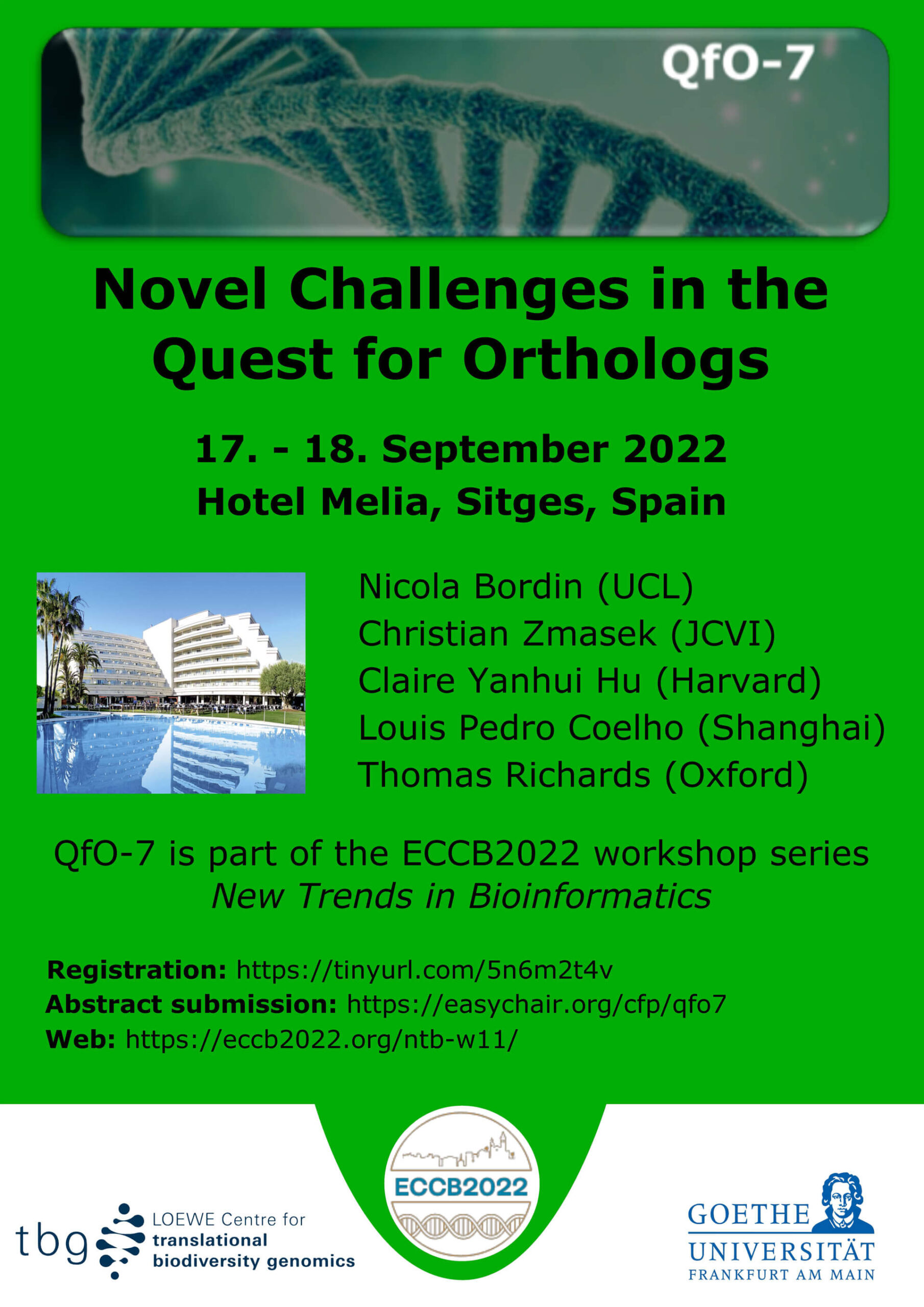Title
Novel challenges in the quest for orthologs
Workshop details
- Date: Sunday, September 18th
- Time: 14:00 to 18:00 CEST (Slot 26)
- Format: Face-to-face
- Room: TBD
- Note: The workshop is part of the two-days meeting Quest-for-Orthologs 7. Follow the link for further details: https://tinyurl.com/5n6m2t4v
Organisers
- Ingo Ebersberger, Goethe University Frankfurt, Frankfurt (Germany)
- Michael Hiller, Senckenberg Society for Nature Research, Frankfurt am Main (Germany)
- Thomas Rattei, University of Vienna, Vienna (Austria)
- Paul D. Thomas, University of Southern California, Los Angeles (USA)
- Sofia Kirke Forslund, Max-Delbrück-Centre for Molecular Medicine, Berlin (Germany)
Topic
Orthology inference is a fundamental step in molecular evolutionary biology. It forms the basis of reconstructing the evolutionary relationships of genes and the species they reside in, and it contributes to unravelling the genetic basis underlying the commonalities and specifics of contemporary but also of extinct species. At the same time, the diversity of data types, the amount and complexity of data, the benchmarking of orthology assignment tools, and ultimately the dissemination of orthology assignments together with the underlying data into a global community makes the Quest for Orthologs a major pursuit of modern bioinformatics. In this session, we will present and discuss novel data, novel challenges and novel applications in the context of orthology inference
Abstract
Orthologs are evolutionarily related genes in different species whose separation from the same ancestral sequence was initiated by a speciation event. The identification of orthologs is fundamental for biological sequence analysis both in an evolutionary and functional context. For the bioinformatics community, the quest for orthologs poses a rich source of challenges ranging from the development of scalable algorithms for ortholog classification to the hosting of dedicated data repositories to disseminate orthology assignments into a global community. As such, the development and improvement of orthology inference tools has to keep up with the evolution in the underlying data with respect to both quantity and quality. Some of the currently most pressing challenges are the following. The Darwin Tree of Life project alone will sequence over 70,000 eukaryotic genomes over the next several years. This data is invaluable for biodiversity genomics, but renders the development of orthology inference methods that scale to this wealth of data an urgent task. In the same way as the taxonomic breadth of sequenced organisms increases, deep orthology relationships between genes in distantly related species or between rapidly evolving sequences move into focus. Here, novel algorithms that incorporate information provided by the increasing availability of accurate protein structure predictions may help. The functional diversity and relevance of non-coding RNAs in the regulatory network of a cell, which emerged in the past decade, requires dedicated tools whose standards meet those achieved for protein coding genes. Eventually, the focus beyond cellular organisms is necessary given the spread of pathogenic viruses worldwide. Viral genes diverge quickly and often their evolutionary history is reticulated due to frequent recombination and horizontal gene transfer. Overlapping genes and polyprotein further complicate the identification of orthologous groups. This workshop aims at highlighting these novel challenges in the quest for orthologs for which innovative bioinformatics solutions are urgently needed. The session goal is to communicate these topics to, and to discuss possible approaches with a diverse bioinformatics community. This will significantly broaden the methodological basis from which future approaches of orthology inference can be built on and fosters the formation of new collaborations that will significantly advance the field of orthology inference.
Target Audience
The QfO Consortium addresses a key challenge in molecular evolutionary biology and strives to develop large-scale methods for inferring orthology among fully sequenced genomes, and to reconstruct the complement of protein-coding genes in common ancestral genomes across the tree of life. To this end, QfO brings together orthology researchers, tool developers and end users in a synergistic, collaborative manner. In addition to its obvious inherent scientific relevance, these activities have immense practical application in pharmacology and biomedicine. Given this spectrum, this workshop will be of interest for a very broadly interested target audience
Programme
| TIME | CONTENT |
|---|---|
| 14:00 – 14:05 | Welcoming and opening of the workshop |
| 14:05 – 14:35 | Nicola Bordin AlphaFold 2, ultra-fast structural comparisons and deep learning to distinguish relatives |
| 14:35 – 15:05 | Claire Yanhui Hu DIOPT: an integrative resource of ortholog/paralog prediction |
| 15:05 – 15:25 | Felix Langschied ncOrtho: Targeted search for miRNA orthologs |
| 15:25 – 15:45 | Contributed talk TBC |
| Break | |
| 16:10 – 16:40 | Louis Pedro Coelho Big catalogs and small genes. Finding structure in prokaryotic genes using metagenomics |
| 16:40 – 17:10 | Christian Zmasek Classifying Viral Proteins into Strict Ortholog Groups Using Domain-architecture Aware Inference of Orthologs |
| 17:10 – 17:40 | Thomas Richards The Darwin tree of life project and linking large inventories of genome data to understanding orthologue groups and phenotype evolution |
| 17:40 – 18:00 | Contributed talk TBC |
Call for abstracts
Call for abstract is open. If interested in participating on this workshop, please submitt your work through the following link: https://easychair.org/cfp/qfo7
